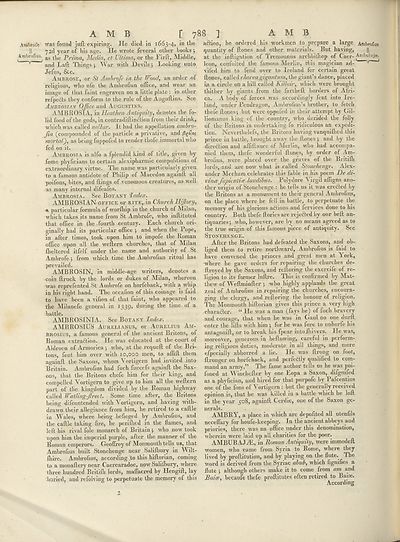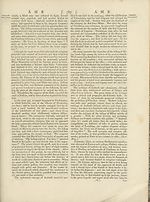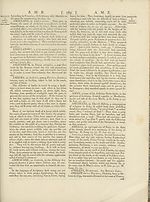Encyclopaedia Britannica, or, a Dictionary of arts, sciences, and miscellaneous literature : enlarged and improved. Illustrated with nearly six hundred engravings > Volume 1, A-AME
(840) Page 788
Download files
Complete book:
Individual page:
Thumbnail gallery: Grid view | List view

A M B [ ] A M B
AntWofe was found juft expiring. He died in 1663-4, in the
II 7 2d year of his age. He wrote feveral other books }
4 mbrofius.^ as {j)e Pf'ima, Media, et Ultima, or the I irft, Middle,
and Laft Things j War with JDevils ; Looking unto
Jeius, &c.
Ambrose, or St Ambrqfe in the TFood, an order of
religious, who ufe the Ambrofian office, and wear an
image of that faint engraven on a little plate : in other
refpects they conform to the rule of the Auguftins. See
Ambrosias OJfice and Augustins.
AMBROSIA, in Heathen Antiquity, denotes the fo¬
lk! food of the gods, in contradiftinftion from their drink,
which was called nc&ar. It had the appellation ambro-
Jia (compounded of the particle « privative, and /Sg&k?
mortal^, as being fuppofed to render thofe immortal who
fed on it.
Ambrosia is alfo a fplendid kind of title, given by
fome phyficians to certain alexipharmic compolitions ot
extraordinary virtue. The name was particularly given
to a famous antidote of Philip of Macedon againft all
poifons, bites, and ftings of venomous creatures, as well
as many internal difeafes.
Ambrosia. See Botany 'Index.
AMBROSIAN OFFICE or RITE, in Church Hi/lory,
a particular formula of worfhip in the church of Milan,
which takes its name from St Ambrofe, who inftituted
that office in the fourth century. Each church ori¬
ginally had its particular office and when the Pope,
in after times, took upon him to impofe the Roman
office upon all the weftern churches, that ol Milan
fbeltered itfelf under the name and authority of St
Ambrofe ", from which time the Ambrofian ritual has
prevailed.
AMBROSIN, in middle-age writers, denotes a
coin ftruck by the lords or dukes of Milan, whereon
was reprefented St Ambrofe on horfeback, with a whip
in his right hand. The occafion of this coinage is faid
to have been a vilion ol that faint, who appeared to
the Milanefe general in 1339, during the time of a
battle.
AMBROSINIA. See Botany Index.
AMBROSIUS Aurelianus, or Aurelius Am-
BROSlus, a famous general of the ancient Britons, of
Roman extraction. He was educated at the court of
Aldroen of Armorica 5 who, at the requeft of the Bri¬
tons, fent him over with 10,000 men, to affift them
againft the Saxons, whom Vortigern had invited into
Britain. Ambrofius had luch fucceis againft the Sax¬
ons, that the Britons chofe him for their king, and
compelled Vortigern to give up to him all the weftern
part of the kingdom divided by the Roman highway
called Watling-Jlreet. Some time after, the Britons
being difcontended with Vortigern, and having with¬
drawn their allegiance from him, he retired to a caftle
in Wales, where being befieged by Ambrofms, and
the caftle taking fire, lie periffied in the flames, and
left his rival foie monarch of Britain ; who now took
upon him the imperial purple, after the manner of the
Roman emperors. CJeoflrey of Monmouth tells us, that
Ambrofius built Stonehenge near Saliffiury in Wilt-
ftrire. Ambrofius, according ;to this hiftorian, coming
to a monaftery near Caercaradoc, now Salifbury, where
three hundred Britifti lords, maffacred by Hengift, lay
buried, and refolving to perpetuate the memory of this
aCtion, he ordered his workmen to prepare a large Anibrofms
quantity of ftones and other materials. But having, |1
at the inlligation of Tremounus archbilhop of Caer- An.bubajas
Icon, confulted the famous Merlin, this magician ad- v_ '
vifed him to fend over to Ireland for certain great
ftones, called choreagigantnm, the giant’s dance, placed
in a circle on a hill called Killair, which were brought
thither by giants from the fartheft borders of Afri¬
ca. A body of forces was accordingly font into Ire¬
land, under Pendragon, Ambrolius’s brother, to fetch
thefe ftones j but were oppofed in their attempt by Gil-
liomanus king of the country, who derided the folly
of the Britons in undertaking fo ridiculous an expedi¬
tion. Neverthelefs, the Britons having vanquilhed this
prince in battle, brought away the ftones j and by the
direction and affiftance of Merlin, who had accompa¬
nied them, thefe wonderful ftones, by order of Am¬
brofius, were placed over the graves of the BritifU
lords, und are now what is called Stonehenge. Alex¬
ander Mecham celebrates this fable in his poem De (li¬
mner Japientice laudibus. Polydore ^ irgil affigns ano¬
ther origin of Stonehenge : he tells us it was ereCled by
the Britons as a monument to their general Ambrofius,
on the place where he fell in battle, to perpetuate the
memory of his glorious aCtions and fervices done to his
country. Both thefe ftories are rejeCted by our beft an¬
tiquaries; who, however, are by no means agreed as to
the true origin of this famous piece of antiquity. See
Stonehenge.
After the Britons had defeated the Saxons, and ob¬
liged them to retire northward, Ambrofius is faid to
have convened the princes and great men at \ ork,
where he gave orders for repairing the churches de-
ftroyed by the Saxons, and reftoring the exercife of re¬
ligion to its former luftre. ft his is confirmed by Mat¬
thew of Weftminfter ; who highly applauds the great
zeal of Ambrofius in repairing the churches, encoura¬
ging the clergy, and reftoring the honour of religion.
The Monmouth hiftorian gives this prince a very high
character. “ He was a man (fays he) of fuch bravery
and courage, that when he was in Gaul no one durll
enter the lifts with him ; for he was fure to unhorfe his
antagonift, or to break his fpear intoihivers. He was,
moreover, generous in bellowing, careful in perform¬
ing religious duties, moderate in all things, and more
especially abhorred a lie. He was ftrong on foot,
ftronger on horieback, and perfectly qualified to com¬
mand an army.” ft he fame author tells us he was poi-
foned at Winchefter by one Eopa a Saxon, difguifed
as a phyfician, and hired for that purpofe by Pafcentius
one of the fons of Vortigern : but the generally received
opinion is, that he was killed in a battle which he loft
in the year 508, againft Cerdic, one of the Saxon ge¬
nerals.
AMBRY, a place in which are depofited all utenfils
neceffary for houfe-keeping. In the ancient abbeys and
priories, there Avas an office under this denomination,
wherein Avere laid up all charities for the poor.
AMBU B AJkE, in Roman Antiquity, Avere immodeft
Avomen, who came from Syria to Rome, Avhere they
lived by proftitution, and by playing on the flute. I he
Avord is derived from the Syriac abub, which fignifies a
flute ; although others make it to come from am and
Raier, becaufe thefe proftitutes often retired to Baiae.
According
AntWofe was found juft expiring. He died in 1663-4, in the
II 7 2d year of his age. He wrote feveral other books }
4 mbrofius.^ as {j)e Pf'ima, Media, et Ultima, or the I irft, Middle,
and Laft Things j War with JDevils ; Looking unto
Jeius, &c.
Ambrose, or St Ambrqfe in the TFood, an order of
religious, who ufe the Ambrofian office, and wear an
image of that faint engraven on a little plate : in other
refpects they conform to the rule of the Auguftins. See
Ambrosias OJfice and Augustins.
AMBROSIA, in Heathen Antiquity, denotes the fo¬
lk! food of the gods, in contradiftinftion from their drink,
which was called nc&ar. It had the appellation ambro-
Jia (compounded of the particle « privative, and /Sg&k?
mortal^, as being fuppofed to render thofe immortal who
fed on it.
Ambrosia is alfo a fplendid kind of title, given by
fome phyficians to certain alexipharmic compolitions ot
extraordinary virtue. The name was particularly given
to a famous antidote of Philip of Macedon againft all
poifons, bites, and ftings of venomous creatures, as well
as many internal difeafes.
Ambrosia. See Botany 'Index.
AMBROSIAN OFFICE or RITE, in Church Hi/lory,
a particular formula of worfhip in the church of Milan,
which takes its name from St Ambrofe, who inftituted
that office in the fourth century. Each church ori¬
ginally had its particular office and when the Pope,
in after times, took upon him to impofe the Roman
office upon all the weftern churches, that ol Milan
fbeltered itfelf under the name and authority of St
Ambrofe ", from which time the Ambrofian ritual has
prevailed.
AMBROSIN, in middle-age writers, denotes a
coin ftruck by the lords or dukes of Milan, whereon
was reprefented St Ambrofe on horfeback, with a whip
in his right hand. The occafion of this coinage is faid
to have been a vilion ol that faint, who appeared to
the Milanefe general in 1339, during the time of a
battle.
AMBROSINIA. See Botany Index.
AMBROSIUS Aurelianus, or Aurelius Am-
BROSlus, a famous general of the ancient Britons, of
Roman extraction. He was educated at the court of
Aldroen of Armorica 5 who, at the requeft of the Bri¬
tons, fent him over with 10,000 men, to affift them
againft the Saxons, whom Vortigern had invited into
Britain. Ambrofius had luch fucceis againft the Sax¬
ons, that the Britons chofe him for their king, and
compelled Vortigern to give up to him all the weftern
part of the kingdom divided by the Roman highway
called Watling-Jlreet. Some time after, the Britons
being difcontended with Vortigern, and having with¬
drawn their allegiance from him, he retired to a caftle
in Wales, where being befieged by Ambrofms, and
the caftle taking fire, lie periffied in the flames, and
left his rival foie monarch of Britain ; who now took
upon him the imperial purple, after the manner of the
Roman emperors. CJeoflrey of Monmouth tells us, that
Ambrofius built Stonehenge near Saliffiury in Wilt-
ftrire. Ambrofius, according ;to this hiftorian, coming
to a monaftery near Caercaradoc, now Salifbury, where
three hundred Britifti lords, maffacred by Hengift, lay
buried, and refolving to perpetuate the memory of this
aCtion, he ordered his workmen to prepare a large Anibrofms
quantity of ftones and other materials. But having, |1
at the inlligation of Tremounus archbilhop of Caer- An.bubajas
Icon, confulted the famous Merlin, this magician ad- v_ '
vifed him to fend over to Ireland for certain great
ftones, called choreagigantnm, the giant’s dance, placed
in a circle on a hill called Killair, which were brought
thither by giants from the fartheft borders of Afri¬
ca. A body of forces was accordingly font into Ire¬
land, under Pendragon, Ambrolius’s brother, to fetch
thefe ftones j but were oppofed in their attempt by Gil-
liomanus king of the country, who derided the folly
of the Britons in undertaking fo ridiculous an expedi¬
tion. Neverthelefs, the Britons having vanquilhed this
prince in battle, brought away the ftones j and by the
direction and affiftance of Merlin, who had accompa¬
nied them, thefe wonderful ftones, by order of Am¬
brofius, were placed over the graves of the BritifU
lords, und are now what is called Stonehenge. Alex¬
ander Mecham celebrates this fable in his poem De (li¬
mner Japientice laudibus. Polydore ^ irgil affigns ano¬
ther origin of Stonehenge : he tells us it was ereCled by
the Britons as a monument to their general Ambrofius,
on the place where he fell in battle, to perpetuate the
memory of his glorious aCtions and fervices done to his
country. Both thefe ftories are rejeCted by our beft an¬
tiquaries; who, however, are by no means agreed as to
the true origin of this famous piece of antiquity. See
Stonehenge.
After the Britons had defeated the Saxons, and ob¬
liged them to retire northward, Ambrofius is faid to
have convened the princes and great men at \ ork,
where he gave orders for repairing the churches de-
ftroyed by the Saxons, and reftoring the exercife of re¬
ligion to its former luftre. ft his is confirmed by Mat¬
thew of Weftminfter ; who highly applauds the great
zeal of Ambrofius in repairing the churches, encoura¬
ging the clergy, and reftoring the honour of religion.
The Monmouth hiftorian gives this prince a very high
character. “ He was a man (fays he) of fuch bravery
and courage, that when he was in Gaul no one durll
enter the lifts with him ; for he was fure to unhorfe his
antagonift, or to break his fpear intoihivers. He was,
moreover, generous in bellowing, careful in perform¬
ing religious duties, moderate in all things, and more
especially abhorred a lie. He was ftrong on foot,
ftronger on horieback, and perfectly qualified to com¬
mand an army.” ft he fame author tells us he was poi-
foned at Winchefter by one Eopa a Saxon, difguifed
as a phyfician, and hired for that purpofe by Pafcentius
one of the fons of Vortigern : but the generally received
opinion is, that he was killed in a battle which he loft
in the year 508, againft Cerdic, one of the Saxon ge¬
nerals.
AMBRY, a place in which are depofited all utenfils
neceffary for houfe-keeping. In the ancient abbeys and
priories, there Avas an office under this denomination,
wherein Avere laid up all charities for the poor.
AMBU B AJkE, in Roman Antiquity, Avere immodeft
Avomen, who came from Syria to Rome, Avhere they
lived by proftitution, and by playing on the flute. I he
Avord is derived from the Syriac abub, which fignifies a
flute ; although others make it to come from am and
Raier, becaufe thefe proftitutes often retired to Baiae.
According
Set display mode to:
![]() Universal Viewer |
Universal Viewer | ![]() Mirador |
Large image | Transcription
Mirador |
Large image | Transcription
Images and transcriptions on this page, including medium image downloads, may be used under the Creative Commons Attribution 4.0 International Licence unless otherwise stated. ![]()
| Permanent URL | https://digital.nls.uk/193142905 |
|---|
| Attribution and copyright: |
|
|---|
| Description | Ten editions of 'Encyclopaedia Britannica', issued from 1768-1903, in 231 volumes. Originally issued in 100 weekly parts (3 volumes) between 1768 and 1771 by publishers: Colin Macfarquhar and Andrew Bell (Edinburgh); editor: William Smellie: engraver: Andrew Bell. Expanded editions in the 19th century featured more volumes and contributions from leading experts in their fields. Managed and published in Edinburgh up to the 9th edition (25 volumes, from 1875-1889); the 10th edition (1902-1903) re-issued the 9th edition, with 11 supplementary volumes. |
|---|---|
| Additional NLS resources: |
|

